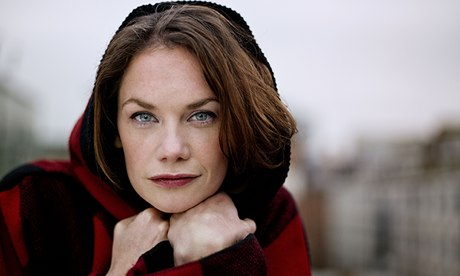
"Um," says Ruth Wilson worriedly, her brow furrowing and her long limbs coiling in embarrassment around her chair. "I am a bit of a control freak. Well, not really. Not totally." She halts. "OK, I am a bit." Blimey. All I've asked is whether she's ever performed drunk. She seems scandalised by the notion. "No, no," she says. "The idea of not being in control of your faculties, I don't think so. Too much responsibility. Too scared!"
Fear isn't a concept you associate with Wilson, who has made her reputation in some unflinching roles: a sensuous Stella in A Streetcar Named Desire, a psychologically harrowing Karin in Ingmar Bergman's Through a Glass Darkly, Anna Christie in Eugene O'Neill's play of the same name – a performance so courageous and incandescent it generated its own Guardian editorial, along with her second Olivier award. She came to wider view as a tough-minded Jane Eyre in the BBC's 2006 adaptation; her most recent TV role, as the murderous scientist Alice Morgan in Luther, was more intense still, leading USA Today to call her "a seductive psycho".
Today, she's in final rehearsals for her latest show, a trio of short plays by O'Neill. The venue is a former music hall in east London; it will be the first time Wilson has directed professionally. She and her co-director, Sam Yates, are even building a pop-up saloon modelled on the one the playwright notoriously frequented. (Hence my question about booze: the scripts drip with the stuff.) "I knew I wanted to direct," she says, "but didn't know what or when." Then she got talking to Yates, "and he said, 'I've found these amazing O'Neill shorts, you should come and read some.' I've been in love with O'Neill ever since doing Anna Christie, so I did." Soon, the pair were auditioning actors, then plunged straight into rehearsals. How has she found the experience? "I haven't really had a chance to think about it. Which is probably good."
Being thrown in at the deep end seems fitting for these plays, early one-acters by O'Neill that, despite their brevity, are as baroquely dramatic and full-blooded as any of his major works. In one, The Web, a tubercular prostitute argues with her pimp, before a gun is abruptly pulled. Another, The Dreamy Kid, which Wilson is directing, centres on an African-American man who's simultaneously attempting to come to terms with his dying grandmother and his murderous past. "There's something visceral in them," Wilson says. "They're about how exposing and brutal life is, beautiful but also brutal. There's a wonderful quote from him: 'It's sheer present-day judgment to think tragedy as unhappy.'" She grins. "There's something interesting in that."
Wilson's own background isn't remotely theatrical: her mother is a retired probation officer, her father a former investment manager. (He doesn't share her passion for O'Neill. "He can't face the thought of a four-hour play," she laughs.) She got her first break at the age of 11, in Sunbury-on-Thames youth theatre, in an unlikely sounding adaptation of cult gangster film The Warriors starring one of her elder brothers. It seems a long way from the stockbroker suburbs to these sweaty, sorrowful New York tenements.
Though her ascent has been rapid – she's still just 31 – she seems at ease with her growing fame, if bemused by the attention. "I was walking outside with Jamie, the assistant director, and this girl just ran up and started screaming, 'Oh my god, what are you doing with her?' And then she just ran off." She looks blank. "Just bizarre." Equally odd, she adds, was the rumour that ran like wildfire around the gossip magazines earlier this year: that she and her co-star on Anna Christie, Jude Law, were an item. She sets her mouth into a precise line. "Good friends," she says. "We're producing a film together."
She seems to be hedging her bets as to what to do next. The Affair, a pilot for the US network Showtime, in which she plays a ranch manager's wife who stumbles into bed with Dominic West, is in the can, though it's not certain the series will get commissioned. A script on the intriguing subject of her grandfather – a novelist and spy who led a number of double lives – is in development. There's also a new stage project with an old friend, director Carrie Cracknell, but she refuses to elaborate: "I've got to keep schtum!"
She can't imagine a life without theatre, she says, but she has ambitions to do more film and TV. "What I want keeps changing. I've been following my gut instinct so far. But I want to be part of all of it." How about something fun, after this run of ill-starred heroines? She sighs. "Yeah, I don't know what happened to me. Maybe I should do panto. Would anyone go and see that?"
Wilson seemed on the cusp of the genuine big time this summer with wild west caper The Lone Ranger, when its director Gore Verbinski proclaimed her a star in the making. It's a prediction few would doubt, though not attached to that particular movie. She shrugs. "It bombed. Though actually, it made its money back. I'm still proud of that film. It's better than most blockbusters."
There is an appealing lack of fuss to Wilson; it is hard to imagine her being detained by anything for long, if she set her mind to it. "It's exciting," she says. "Working to get where you're at – and suddenly you can make things happen. As long as you've got the drive, you can get there."

